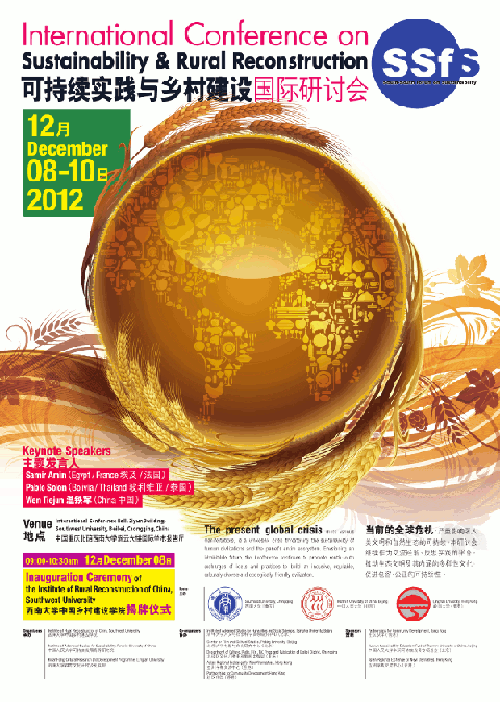Event Title
2012 可持續實踐與鄉村建設國際研討會
Start Date
9-12-2012 10:30 AM
End Date
9-12-2012 11:45 AM
Language
Putonghua
Description
自1978年改革以来,中国以牺牲环境为代价步入了高速的工业化。汉江及其支流受到许多低成本运营的中小企业严重污染。随着27%的汉江水将被南水北调到北京,这意味着下游人民也会面临同样的问题。面对所有这些问题,公众通常是责备政府而非行动起来解决问题。直到2002年,运建立发起了湖北省第一个民间环保组织“绿色汉江”。而绿色汉江的核心团队是由几位退休老人组成的。
作为一位老年女性,运建立站在调研、监督、倡导、教育行动和地方村级水项目的最前线。她给3000多人做过600多次演讲。大家都叫她“赤脚环保主义者”或者“环保奶奶”。在整个团队志愿工作的基础上,她用热情和坚持感动了很多人。包括政府、市民、企业、学校、幼儿园,不管是年老的或年轻的、教育家还是村庄社区等社会各阶层,都参与了进来。绿色汉江现有团体会员66个,个体会员160个,3000多名志愿者。经过他们的努力,整治汉江及其支流的污染已经取得到了突破性的转变。越来越多的襄阳人知道了环境问题就在身边,“关爱母亲河,保护水资源”已逐渐变成广大民众的自觉行动。作为一个以社区为本的组织,绿色汉江不是依靠外界的资助,而是依靠志愿者们的热情和责任承担。
运建立和她的志愿者们证明了普通人如何能用行动带来社会和生态环境的改变。越来越多城市和乡村的人们出于基本的生计关切投入到绿色运动当中,而不只是中产阶级的共识。随着数以万计的人们真正的民主志愿参与,这才成为一项可持续的运动。
Since the reform of 1978, China’s high speed industrialization was carried out at the expense of the environment. The Han River and its tributaries were seriously polluted by a lot of small and medium factories operating at low cost. In addition, the diverting of 27% of the river water from Han River to Beijing in the north also means added problems to the people living downstream. Faced with all the problems, the public might blame the government but would not take up action to address the problems. Until 2002, YUN Jianli initiated ‘Green Han River’, the first non-governmental organization for environmental protection in Hubei Province. And the core team of the organization is made up of several retired.
As an elderly lady, YUN Jianli is at the forefront of the investigations, monitoring, advocacy, educational campaigns and local water projects in villages. She has delivered over 600 talks to 300,000 audiences. People always call her ‘Barefoot Environmentalist’, or ‘Granny Eco’. With the entire team working on a voluntary basis, she has moved many people with her passion and her persistence. They engage with all sectors of society including the government, urban citizens, enterprises, schools, kindergartens, old and young volunteers, educationists, as well as at the village and community level. Green Han River currently has a membership of 66 organizations, 160 individuals, and more than 30,000 volunteers. Through their efforts, a remarkable change has taken place in rectifying the serious pollution of the Han River and its tributaries. More and more people in Xiangyang are becoming aware of the environmental problem. ‘Protecting the water resource, protecting our mother river’ has become the common consciousness of Xiangyang people. As a community-based organization, it has depended not on external funding but on the enthusiasm and commitment of the volunteers.
YUN Jianli and her volunteers demonstrate how ordinary people can take action for social and eco-environment change. More and more people participate in the green movement which is not simply a concern of the middle class, but a concern of the majority of rural and urban population for basic livelihood. This is becoming a sustained movement with the voluntary, genuine and democratic participation of tens of thousands of people.
Document Type
Conference
Recommended Citation
运建立、赵玲 (2012,12月)。"绿色汉江" 河流保护运动的城市动员。發表於 2012可持續實踐與鄉村建設國際研討會,西南大学,中國重慶市。
Included in
Demography, Population, and Ecology Commons, Growth and Development Commons, Other International and Area Studies Commons, Place and Environment Commons, Sociology of Culture Commons
"绿色汉江" 河流保护运动的城市动员 = The city mobilization of ‘Green Han River’for river protection movement
自1978年改革以来,中国以牺牲环境为代价步入了高速的工业化。汉江及其支流受到许多低成本运营的中小企业严重污染。随着27%的汉江水将被南水北调到北京,这意味着下游人民也会面临同样的问题。面对所有这些问题,公众通常是责备政府而非行动起来解决问题。直到2002年,运建立发起了湖北省第一个民间环保组织“绿色汉江”。而绿色汉江的核心团队是由几位退休老人组成的。
作为一位老年女性,运建立站在调研、监督、倡导、教育行动和地方村级水项目的最前线。她给3000多人做过600多次演讲。大家都叫她“赤脚环保主义者”或者“环保奶奶”。在整个团队志愿工作的基础上,她用热情和坚持感动了很多人。包括政府、市民、企业、学校、幼儿园,不管是年老的或年轻的、教育家还是村庄社区等社会各阶层,都参与了进来。绿色汉江现有团体会员66个,个体会员160个,3000多名志愿者。经过他们的努力,整治汉江及其支流的污染已经取得到了突破性的转变。越来越多的襄阳人知道了环境问题就在身边,“关爱母亲河,保护水资源”已逐渐变成广大民众的自觉行动。作为一个以社区为本的组织,绿色汉江不是依靠外界的资助,而是依靠志愿者们的热情和责任承担。
运建立和她的志愿者们证明了普通人如何能用行动带来社会和生态环境的改变。越来越多城市和乡村的人们出于基本的生计关切投入到绿色运动当中,而不只是中产阶级的共识。随着数以万计的人们真正的民主志愿参与,这才成为一项可持续的运动。
Since the reform of 1978, China’s high speed industrialization was carried out at the expense of the environment. The Han River and its tributaries were seriously polluted by a lot of small and medium factories operating at low cost. In addition, the diverting of 27% of the river water from Han River to Beijing in the north also means added problems to the people living downstream. Faced with all the problems, the public might blame the government but would not take up action to address the problems. Until 2002, YUN Jianli initiated ‘Green Han River’, the first non-governmental organization for environmental protection in Hubei Province. And the core team of the organization is made up of several retired.
As an elderly lady, YUN Jianli is at the forefront of the investigations, monitoring, advocacy, educational campaigns and local water projects in villages. She has delivered over 600 talks to 300,000 audiences. People always call her ‘Barefoot Environmentalist’, or ‘Granny Eco’. With the entire team working on a voluntary basis, she has moved many people with her passion and her persistence. They engage with all sectors of society including the government, urban citizens, enterprises, schools, kindergartens, old and young volunteers, educationists, as well as at the village and community level. Green Han River currently has a membership of 66 organizations, 160 individuals, and more than 30,000 volunteers. Through their efforts, a remarkable change has taken place in rectifying the serious pollution of the Han River and its tributaries. More and more people in Xiangyang are becoming aware of the environmental problem. ‘Protecting the water resource, protecting our mother river’ has become the common consciousness of Xiangyang people. As a community-based organization, it has depended not on external funding but on the enthusiasm and commitment of the volunteers.
YUN Jianli and her volunteers demonstrate how ordinary people can take action for social and eco-environment change. More and more people participate in the green movement which is not simply a concern of the middle class, but a concern of the majority of rural and urban population for basic livelihood. This is becoming a sustained movement with the voluntary, genuine and democratic participation of tens of thousands of people.
